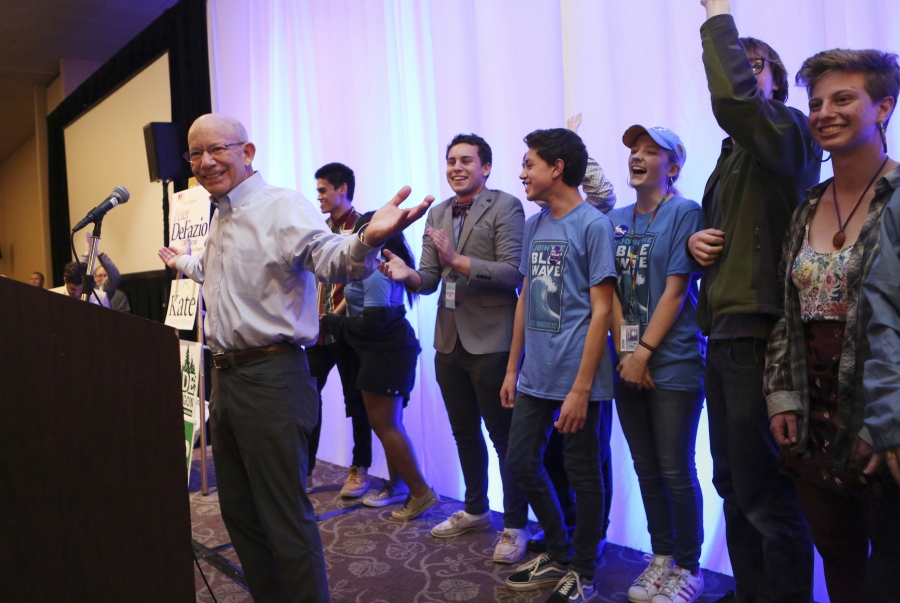WASHINGTON — The likely new chairman of the House Transportation Committee hears renewed talk from the White House about investment in infrastructure and he jokes about Lucy always pulling away the football just as Charlie Brown is about to kick it.
“This is not going to get done without strong support from the president,” said Rep. Peter DeFazio, D-Ore., who will probably become chairman of the committee when the Democrats take control of the House in January. “The president is going to have to be fully on board if we’re going to move something in the Senate.”
President Donald Trump, as a candidate in 2016, made investing in the nation’s crumbling infrastructure a key part of his campaign. After winning the White House, DeFazio said, Trump came under the influence of advisers who told him big projects could be funded by selling off infrastructure to private firms and attracting private capital.
“That could work in very few places,” DeFazio said, “and not resolve any of our major national issues.”
Those advisers no longer work in the administration. In the aftermath of Tuesday’s midterm elections where Democrats won control of the House, DeFazio was asked whether he thought Trump was sincere about pumping money into infrastructure.
“Yes,” he said.
Then he elaborated:
“Trump is a builder. He gets it,” DeFazio said. “The president got that as a candidate. He got derailed by the [economic advisers] he brought on board.”
DeFazio also declined to rule out a return to earmarks, a process in which members funded pet projects in their districts, bypassing the Department of Transportation or other federal agencies that normally control such funding.
The push to invest billions – DeFazio suggested $500 billion – in infrastructure comes less than a year after a Republican Congress passed a sweeping tax cut that is projected to add more than $1 trillion to the deficit over 10 years.
DeFazio said the White House “had a finger in the wind” and dispatched an emissary to meet with him before Tuesday’s election.
“I would hope that we could have [an infrastructure] package through the House in six months, before we get into the silliness of the presidential election year,” DeFazio said.
After 31 years in Congress, DeFazio said he knows “there’s myriad ways” to come up with transportation funding.
“It has to be real,” he said. “We’re not going to do pretend stuff, like asset recycling, we’re not going to do massive privatization.”
He suggested a path to allow bond sales for infrastructure improvement to roads, highways, bridges and transit, with the money to be repaid by indexing the federal tax on gas and diesel fuel.
“In my one meeting with President Trump,” DeFazio said, “he talked about a substantial increase in the user fees – the gas tax. The president is going to have to be fully on board if we’re going to move [a gas tax increase] in the senate.”
Ultimately, DeFazio said, transportation costs should be funded through a system that taxes vehicles for the number of miles they travel.
“That won’t be what we’re going to do this year, but that may well come into play in the reauthorization in 2020,” he said.
The current transportation bill, which expires in 2020, is not fully funded.
DeFazio said the process of reaching a consensus would be helped by the absence of House Speaker Paul Ryan. The Wisconsin Republican did not seek reelection.
“Paul was ideologically opposed to a federal investment in infrastructure,” DeFazio said. “He subscribed to the philosophy that if it was worth doing, the private sector will do it.”
DeFazio said the Transporation Committee would increase scrutiny of Trump’s Department of Transportation, an agency headed by Secretary Elaine Chao, a matter complicated on Capitol Hill because she is the wife of Senate Majority Leader Mitch McConnell, R-Ky.
“There is bipartisan concern on the Hill that DOT is slow-walking all of the transit grants, not expending funds that were approved by a Republican Congress for transit,” DeFazio said.
He said there was speculation the delay was to avoid advancing in the queue the Gateway Program, a $30 billion plan that includes building a new Amtrak tunnel into New York and rehabilitating the existing ones.
Earmarks, banned when Republicans took control of Congress in 2011, often were described as the grease than made the body function, as it allowed for horse trading of a prized district project in return for a vote on an unrelated issue.
“That’s a discussion we’ll be having,” DeFazio said when asked whether earmarks might return. “This is a discussion we will be having internally in the [Democratic] caucus. I’m not going to get ahead of my caucus.”
Earmarks fell from favor, in part, as a result of the infamous “bridge to nowhere,” a $398 million project tucked into a federal transportation bill by two Alaska Republicans, Sen. Ted Stevens and Rep. Don Young. The bridge in Ketchikan, which would have served a small airport and about 50 residents, was never built.
In January, Trump questioned whether a return to earmarks might make Congress a more friendly place.
“Our system lends itself to not getting things done, and I hear so much about earmarks – the old earmark system – how there was a great friendliness when you had earmarks,” Trump said at that January meeting with congressional leaders. “But of course, they had other problems with earmarks. But maybe all of you should start thinking about going back to a form of earmarks.”
infrastructure



